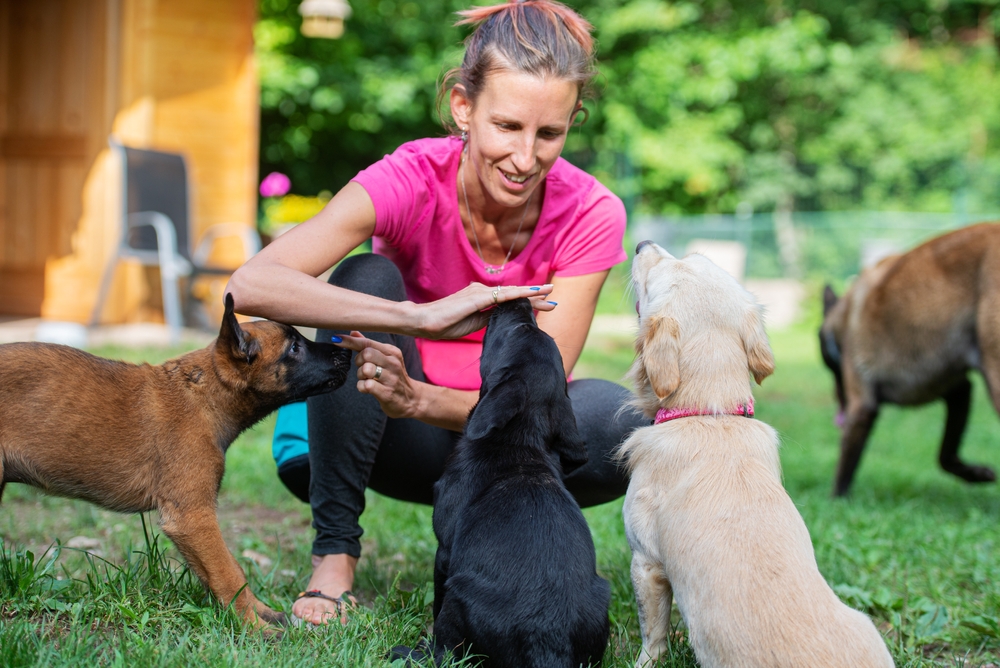Although many pet owners consider a pet reacting to loud noise to be normal, pets with noise aversion experience extreme and prolonged stress and anxiety when exposed to noise triggers. Without professional treatment, their response can worsen. The Westerville Veterinary Clinic team can help pet owners manage noise phobias and improve their furry pals’ quality of life. We answer frequently asked pet owner questions to prepare pet families for July Fourth, the summer storm season, and beyond.
Question: What is noise aversion in pets?
Answer: Noise aversion is an intense fear or anxiety in pets after hearing loud or unexpected sounds, such as thunderstorms or fireworks. Any noise can become a trigger, including household noises like vacuum cleaners, fire alarms, or appliances. With thunderstorm phobias, pets may also react to air pressure changes, rain, or lighting. Pets should recover quickly, but they typically feel and act stressed long after the noise ends. Severe noise aversion can decrease a pet’s quality of life or put them at risk for injury.
Q: What causes noise aversion in pets?
A: The exact cause of noise aversion is still being debated, but like most anxiety disorders, several factors combined are the likely reason. Pets may be genetically predisposed to anxiety or have experienced a traumatic event that they associate with noise that worsens with each additional exposure. Some research shows that herding breeds may be more likely to experience noise aversion.
Q: What are noise aversion signs in pets?
A: Pets with noise aversion may experience the following signs during and after hearing their trigger noise:
- Trembling
- Hiding
- Attempting to escape a crate, room, or home
- Excessive vocalization
- Pacing or restlessness
- Panting or drooling
- Destructive behavior
- Clinginess
Q: How do veterinarians diagnose noise aversion?
A: Noise aversion is underdiagnosed, because many pet owners mistakenly believe their pet’s behavior is normal. Also, a long time may pass between a noise event and a routine veterinary visit and pet owners forget to bring up this concern. Our team can diagnose noise aversion based on a detailed history of your pet’s behavior and the behavioral change triggers. Sometimes, we may refer you to a veterinary behaviorist to rule out other behavior disorders that could complicate diagnosis.
Q: What treatments are available for noise-averse pets?
A: The goal of noise aversion treatment is to reduce your pet’s overreaction to their triggers and help them relax more during noise events. Most noise aversions cannot be completely cured, but can be significantly improved. Treatment may include:
- Behavior modification — Training techniques, such as desensitization and counter-conditioning, can help pets become accustomed to noise.
- Environmental management — Avoiding trigger noises whenever possible or insulating pets from unavoidable noise is critical during treatment. Noise machines, music, ear wraps, and being kept in interior rooms or basements may help.
- Medication — In moderate to severe cases, we may prescribe anti-anxiety medications or sedatives to reduce their anxiety response and help pets learn alternate behaviors.
Q: Can I try at-home remedies to help my pet with noise aversion?
A: Home and over-the-counter remedies, along with prescription treatments and training techniques, can reduce pet anxiety. Consider the following:
- Creating a safe space — Designate a quiet area with your pet’s familiar toys and bedding where they can retreat during noisy events.
- Use calming aids — Pressure wraps, eye screens, pheromone diffusers, or calming supplements can reduce anxiety.
- Provide distractions — Engage your pet in play or training sessions to distract them from the noise.
- Maintain calm—Your behavior can influence your pet’s anxiety. Acting normally and not fussing over them during noisy events can help convince your pet that the noise is nothing to worry about.
Q: Can noise aversion be prevented in pets?

A: Preventing noise aversion may be possible with early socialization and exposure to various sounds in a positive context. Training young pets to associate noise with positive experiences can be beneficial, but doing this incorrectly can make things worse. Enrolling your pet in a course as a puppy or kitten or consulting with a professional trainer can help.
Noise aversion can cause significant distress for pets and their owners, yet the condition often goes unrecognized and untreated. Intervening early can help prevent a noise phobia from worsening or new problems from developing. Schedule a consultation with the Westerville Veterinary Clinic team to develop a treatment plan if your pet shows noise aversion signs.







Leave A Comment